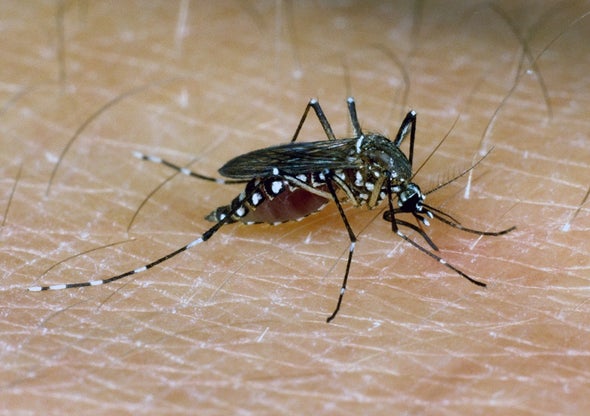(单词翻译:单击)
听力文本
This is Scientific American — 60-Second Science. I'm Karen Hopkin.
Believe it or not, mosquitoes don't bite out of spite. Female mosquitoes of the species Aedes aegypti need the nutrients present in your plasma to ensure the proper development of their eggs. And though their thirst may seem unquenchable, the ladies actually take time to savor your blood once they've sipped their fill.
"After a female bites, she'll double her body weight, and then she'll actually completely lose interest in biting people for several days."
Laura Duvall, a postdoctoral researcher at The Rockefeller University in New York City. The insects' postprandial recovery phase made Duvall and her colleagues wonder whether they could essentially trick mosquitoes into thinking they'd already eaten.
Duvall works in the lab of Leslie Vosshall, who studies genetics, neuroscience and behavior. Here's Vosshall:
"Our idea was that maybe the same drugs that would turn off human appetite might actually work to turn off mosquito appetite."

Turns out that when the Rockefeller researchers fed mosquitoes a drug used to treat people for obesity, the insects were indeed less interested in hunting for their next human meal ticket.
"But the problem was we needed to figure out how the human diet drugs were actually working in the mosquito."
So they isolated the receptor protein with which these diet drugs interact. The receptor...which they dubbed NPYLR7...looks a lot like the receptors that regulate hunger in people.
The researchers knew they had the right receptor because, when they knocked it out in some mosquitos, the drugs no longer dampened the insects' appetite...a finding they describe in the journal Cell.
In fact, the mutant mosquitoes were all-around insatiable.
"So the npylr7 mutants behave really strangely. Even after they take a huge blood meal, they remain thirsty for human blood."
Next, Duvall says they'd like to explore exactly how these drugs act to curb a female's blood lust.
"Does she become less sensitive to the clues that tell her a human is nearby? Or is this like smelling a hamburger after you've already eaten three?"
Either way, the approach could provide a novel method to limit the spread of diseases transmitted by mosquito bite, like dengue and yellow fever. And give us a new way to tell mosquitoes to buzz off.
Thanks for listening for Scientific American — 60-Second Science. I'm Karen Hopkin.
参考译文
这里是科学美国人——60秒科学。我是凯伦·霍普金。
信不信由你,蚊子咬人并不是出于怨恨。埃及伊蚊的雌蚊需要人类血浆中的养分,来确保蚊卵的正常发育。虽然它们的食欲似乎无法抑制,但是雌蚊一旦喝饱了,就会花时间来品尝你的血液。
“雌蚊吸血后,它的体重会增加一倍,接下来几天便会完全失去叮人的兴趣。”
纽约洛克菲勒大学的博士后研究员劳拉·杜瓦尔说到。这种蚊子的餐后恢复期令杜瓦尔和她的同事想知道,他们能否欺骗蚊子,让它们认为自己已经吃过了。
杜瓦尔在莱斯利·沃萨尔的实验室工作,沃萨尔研究遗传学、神经科学和行为学。下面是杜瓦尔所说:
“我们的想法是,或许抑制人类食欲的药物也能抑制蚊子的食欲。”
事实证明,当洛克菲勒大学的研究人员给蚊子喂食一种用于治疗人类肥胖的药物之后,这些蚊子寻找下一个人类饭票的兴趣确实减少了。
“但问题是,我们需要弄清人类减肥药是如何在蚊子体内起作用的。”
因此,他们分离了与这些减肥药相互作用的受体蛋白。他们称之为NPYLR7的受体,看起来与管理人类饥饿的受体很像。
研究人员知道他们找到了正确的受体,因为当他们从一些蚊子的体内去除这一受体后,减肥药便不再抑制蚊子的食欲,他们在《细胞》期刊上描述了这一发现。
事实上,这种变异蚊子根本是贪得无厌的。
“因此,没有NPYLR7受体的变异蚊子的行为的确非常奇怪。即使吸了大量血,它们仍然渴望人类血液。”
杜瓦尔说,接下来他们想探索这些药物如何起作用,从而能抑制雌蚊的嗜血欲望。
“雌蚊对提示它附近有人的线索不那么敏感了?还是就像你在吃了三个汉堡后再闻汉堡的味道那样?”
不管怎样,这种方法都可以提供一种新方法,来限制登革热和黄热病等由蚊虫叮咬传播的疾病的扩散。而且也能给我们提供一种让蚊子走开的新方法。
谢谢大家收听科学美国人——60秒科学。我是凯伦·霍普金。
译文为可可英语翻译,未经授权请勿转载!
重点讲解
重点讲解:
1. believe it or not (强调刚才所述之事令人吃惊)信不信由你;
That's normal, believe it or not.
那很正常,信不信由你。
2. turn off 使丧失兴趣;
What turns teenagers off science and technology?
是什么使青少年对科学技术丧失了兴趣?
3. either way (两种情况中)不论发生哪一种情况;
Was it his fault or not? Either way, an explanation is due.
是他的错或不是?无论是不是,都得有个解释。
4. buzz off 离开;走开,滚开(无礼的话);
Now be quiet and buzz off.
现在请闭嘴并滚开。


